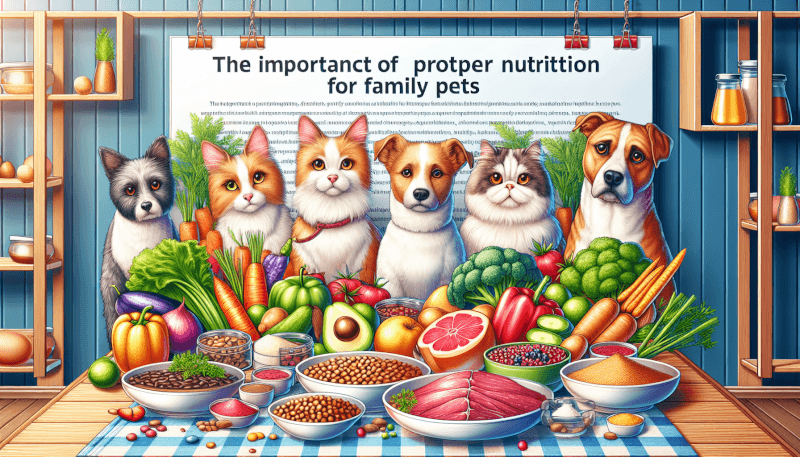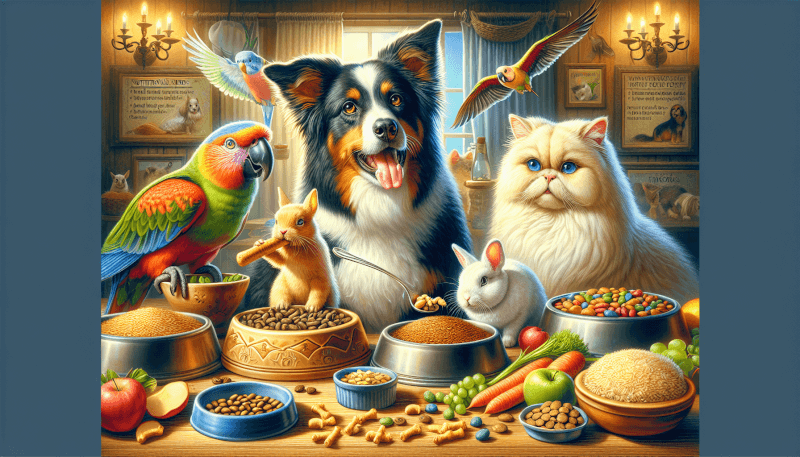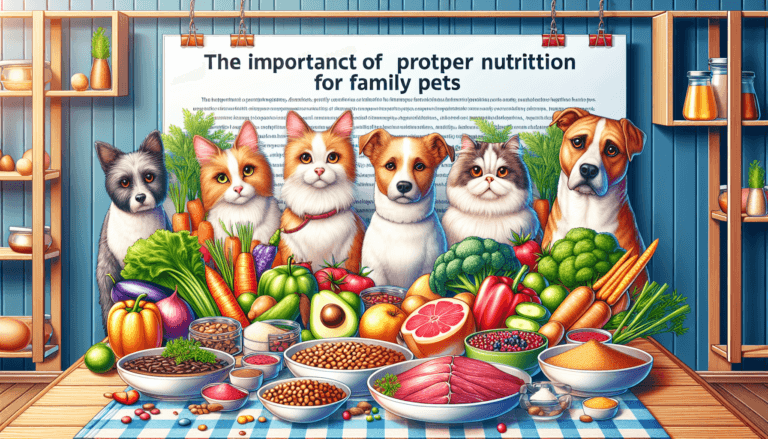Are you concerned about providing the best nutrition for your beloved family pet? Look no further! This article is your guide to understanding the importance of family pet nutrition and how it can positively impact your furry friend’s overall health and well-being. Whether you have a playful pup or a purring feline companion, we’ll explore the key factors to consider when selecting the right diet and ensuring your pet receives the essential nutrients they need. Let’s embark on this journey together and discover the secrets to keeping your family pet happy and healthy through proper nutrition.

Why is Family Pet Nutrition Important?
The role of nutrition in overall pet health
Proper nutrition plays a vital role in maintaining the overall health and well-being of your family pet. Just like humans, pets require a well-balanced diet to thrive and stay healthy. Nutrition is the foundation for their growth, development, and overall quality of life. It helps to support their immune system, maintain a healthy weight, promote strong bones and muscles, and keep their organs functioning optimally. By providing your furry friend with the right nutrients, you can ensure they lead a long, happy, and healthy life.
Ready for Cat Trivia?
Test your knowledge about cats!

Impact of poor nutrition on pets
On the flip side, poor nutrition can have detrimental effects on your pet’s health. Feeding them an unbalanced or inadequate diet can lead to various health problems and a compromised immune system. Obesity, dental issues, joint problems, gastrointestinal disorders, and nutrient deficiencies are just a few examples of what can arise from poor nutrition. It’s important to remember that pets rely solely on their caregivers to meet their nutritional needs, so providing them with the right diet is crucial for their overall well-being.
Benefits of proper nutrition for pets
When you prioritize your family pet’s nutrition, you’re providing them with a multitude of benefits. One significant benefit is the promotion of optimal body condition and weight management. By feeding them a nutritionally balanced diet, you can avoid the risk of underweight or overweight pets, both of which can lead to health issues. Proper nutrition also enhances their immune system, reducing the likelihood of illness and disease. Furthermore, it contributes to healthy skin and coat, promoting a shiny and lustrous appearance. Ultimately, by focusing on your pet’s nutrition, you’re investing in their long-term health and happiness.
Understanding Pet Nutritional Needs
Different dietary requirements for different pets
Just as humans have diverse dietary requirements, different pets have unique nutritional needs. Dogs, cats, birds, and small mammals each require specific nutrients tailored to their species and size. For example, dogs are omnivores, meaning they thrive on a diet that contains both animal and plant-based ingredients. Cats, on the other hand, require a diet rich in animal-based protein as they are obligate carnivores. Understanding the specific dietary requirements of your pet’s species is fundamental in ensuring they receive the nutrients they need to thrive.
Essential nutrients for pets
To meet your pet’s nutritional needs, it’s important to familiarize yourself with the essential nutrients they require. These include proteins, fats, carbohydrates, vitamins, minerals, and water. Proteins are the building blocks essential for growth, maintenance, and repair of tissues and muscles. Fats provide energy, help in the absorption of certain vitamins, and contribute to healthy skin and coat. Carbohydrates serve as a source of energy, while vitamins and minerals play crucial roles in various bodily functions. Finally, water is vital for hydration and maintaining overall health. By ensuring your pet’s diet includes these essential nutrients, you can support their overall well-being.
Factors that affect pet nutritional needs
Several factors can influence the nutritional needs of your family pet. Age, breed, size, activity level, and any existing medical conditions all play a role. Puppies and kittens have different nutritional needs compared to adult or senior pets, as they require more energy and specific nutrients for growth. Large breed dogs have different requirements than small breed dogs, and active pets have higher energy needs than more sedentary ones. It’s crucial to take these factors into account when selecting the right food for your pet to ensure their specific needs are met.
Choosing the Right Pet Food
Types of pet food available
The market offers a wide array of pet food options, making it essential to understand the different types available. Dry food, also known as kibble, is a popular and convenient choice for many pet owners. It is economical, has a long shelf life, and is easy to measure and feed. Wet or canned food, on the other hand, offers higher moisture content, making it beneficial for pets who may not consume enough water. There are also frozen and freeze-dried diets, which can provide a closer-to-raw option for those seeking a natural approach to feeding. Ultimately, each type of pet food has its advantages, so it’s important to choose the one that best suits your pet’s individual needs.
Reading pet food labels
When selecting pet food, it’s crucial to scrutinize the labels to ensure you’re making an informed choice. Look for labels that provide detailed ingredient lists, as well as guaranteed analysis, which provides information on the nutrient content of the food. The ingredient list should contain high-quality, whole-food ingredients, with protein sources listed at the top. Avoid foods that contain artificial preservatives, flavors, and fillers. Additionally, labels may include specific feeding instructions based on your pet’s weight, age, and activity level. Gaining the knowledge to read and understand these labels will empower you to make the best decisions for your pet’s nutrition.
Avoiding common misconceptions in pet food
There are several misconceptions about pet food that are important to dispel. Firstly, while some pet owners may assume that homemade diets are superior, it can be challenging to achieve a well-balanced diet that meets all the necessary nutrient requirements. It’s crucial to seek guidance from a veterinary nutritionist or consult with your veterinarian before implementing homemade diets. Additionally, the terms “natural” and “organic” on pet food labels do not always guarantee superior quality. Reading and understanding the full ingredient list and guaranteed analysis is essential in selecting the right food for your pet.

Balancing Macronutrients in Pet Diets
Importance of macronutrients (proteins, fats, carbohydrates)
Macronutrients, including proteins, fats, and carbohydrates, make up the bulk of your pet’s diet and play critical roles in their overall health. Proteins are the building blocks of tissues and organs, supporting muscle growth, repair, and overall body function. Fats provide a concentrated source of energy, promote skin health, and aid in the absorption of fat-soluble vitamins. Carbohydrates are an additional source of energy and help to maintain healthy digestion. Balancing these macronutrients is essential for ensuring your pet receives the right proportions to meet their specific needs.
Determining appropriate ratios of macronutrients
The appropriate ratios of macronutrients in your pet’s diet will vary depending on their species, breed, age, activity level, and any existing medical conditions. Consulting with your veterinarian or a veterinary nutritionist can help determine the optimal ratios based on your pet’s specific needs. Generally, dogs require a diet that is higher in protein and lower in carbohydrates compared to cats, who require a diet higher in animal-based protein. Larger breed dogs may benefit from lower-fat diets to prevent obesity and joint issues, while active dogs require higher energy levels. Achieving the right balance is crucial in promoting your pet’s overall health and well-being.
Considerations for pets with special dietary needs
Some pets may have special dietary needs due to underlying medical conditions or food allergies. It’s important to work closely with your veterinarian to address these needs appropriately. For example, pets with kidney disease may require a diet low in protein and phosphorus, while pets with food allergies may need a hypoallergenic diet free from common allergens. Additionally, pets with specific conditions, such as diabetes or obesity, may require diets that focus on weight management and blood sugar control. By consulting with your veterinarian, you can ensure your pet’s special dietary needs are met to promote their overall health.
Essential Micronutrients for Pet Health
Vitamins necessary for pet well-being
Vitamins are essential micronutrients that play critical roles in your pet’s overall health. They are necessary for various bodily functions, including maintaining healthy eyesight, supporting the immune system, promoting collagen production, and facilitating proper cellular function. Vitamins can be either water-soluble (such as vitamin C and the B vitamins) or fat-soluble (such as vitamins A, D, E, and K). It’s important to provide your pet with a balanced diet that includes a variety of nutrient-dense ingredients to ensure they obtain the necessary vitamins for optimal health.
Minerals crucial for pet nutrition
Minerals are essential for maintaining healthy bodily functions and are involved in various physiological processes. They play a role in bone and teeth health, nerve signaling, fluid balance, and enzyme activity. Common minerals necessary for your pet’s nutrition include calcium, phosphorus, sodium, potassium, magnesium, and iron. While a balanced diet should provide an adequate supply of minerals, it’s important to note that some minerals can interact, affecting their absorption. Therefore, understanding the mineral content in your pet’s food and consulting with your veterinarian can help ensure they are receiving the appropriate balance.
Supplements and their role in pet nutrition
Supplements can be a helpful addition to your pet’s diet to ensure they receive all the necessary nutrients. However, it’s important to note that supplements should not replace a balanced diet. Common supplements include omega-3 fatty acids for healthy skin and coat, joint supplements for pets with arthritis or joint issues, and probiotics for healthy digestion. While some supplements may be beneficial for certain conditions or deficiencies, it’s crucial to consult with your veterinarian before introducing any supplements to your pet’s diet. They can provide guidance on selecting the right supplements and dosage based on your pet’s specific needs.
Choosing Treats and Snacks Wisely
Healthier alternatives to popular pet treats
Treats and snacks are a wonderful way to show your pet love and reward good behavior. However, it’s important to choose these indulgences wisely to avoid undermining your pet’s overall nutrition. Opt for healthier alternatives to popular pet treats, such as natural treats made from high-quality ingredients or single-ingredient treats like dried meat or vegetables. Look for treats that are low in fat and added sugars, as excessive treats can contribute to weight gain and dental issues. By selecting healthier options, you can provide your pet with a tasty and nutritious reward.
Homemade treats and their benefits
Another option to consider is making homemade treats for your pet. Homemade treats give you full control over the ingredients, allowing you to tailor them to your pet’s specific needs and dietary restrictions. You can use healthy ingredients like lean meats, fruits, and vegetables to create treats that are free from artificial preservatives, flavors, and fillers. Making treats at home can also be a fun bonding activity between you and your pet. Just be sure to research which ingredients are safe for your pet’s species before attempting any homemade treats.
Portion control and moderation in treat feeding
While treats can be an enjoyable part of your pet’s routine, it’s important to exercise portion control and moderation. Treats should make up no more than 10% of your pet’s daily caloric intake to avoid excess calorie consumption. Overfeeding treats can lead to weight gain, nutritional imbalances, and a decreased appetite for their regular meals. It’s helpful to establish a treat schedule and stick to it, ensuring you don’t exceed the recommended treat allowance. By practicing moderation and portion control, you can indulge your pet while maintaining their overall health and nutrition.
Food Allergies and Sensitivities in Pets
Common food allergens for pets
Pets, just like humans, can develop sensitivities or allergies to certain foods. Common food allergies in pets include beef, dairy, wheat, soy, chicken, eggs, fish, and grains. If your pet experiences signs of an allergic reaction after consuming certain foods, such as itching, vomiting, diarrhea, or skin irritations, it’s important to consider a potential food allergy. Identifying the specific allergens can help you select the right food for your pet and prevent future allergic reactions.
Symptoms and effects of food allergies
Food allergies can manifest in various ways in pets, and the symptoms may differ from one individual to another. Common symptoms of food allergies include gastrointestinal problems like vomiting and diarrhea, itching and skin irritations, chronic ear infections, and respiratory issues. If left untreated, food allergies can have detrimental effects on your pet’s overall health and quality of life. It’s essential to work with your veterinarian to identify and manage any food allergies your pet may have to ensure they receive appropriate nutrition without harmful reactions.
Identifying and managing food sensitivities
In addition to food allergies, some pets may have food sensitivities or intolerances that cause digestive upset or other discomforts. These sensitivities may not be outright allergies but can still impact your pet’s overall well-being. Identifying and managing these sensitivities often involves a process of elimination, where potential trigger foods are removed from the diet to observe any improvements in symptoms. It’s important to work closely with your veterinarian to develop a suitable diet plan that addresses your pet’s specific sensitivities and ensures they receive complete and balanced nutrition.
Feeding Schedule and Portion Control
Establishing a regular feeding routine
Establishing a regular feeding routine for your family pet is crucial for their overall health and well-being. Pets thrive on consistency, so providing them with a consistent schedule allows their bodies to adjust and promotes healthy digestion. Determine the appropriate number of meals per day based on your pet’s age, size, and activity level. Puppies and kittens typically require more frequent meals, while adult pets can generally be fed twice a day. By sticking to a regular feeding routine, you can help regulate your pet’s metabolism and prevent overeating.
Determining appropriate portion sizes
Determining the appropriate portion sizes for your pet ensures they receive the right amount of nutrition without overeating or undernourishment. Portion sizes vary depending on factors such as age, size, breed, activity level, and metabolic rate. Consult with your veterinarian to determine the optimal portion sizes for your pet’s specific needs. Additionally, it’s important to regularly assess your pet’s body condition and adjust their portion sizes accordingly. Monitoring their weight and body shape can help you maintain their ideal weight and prevent the onset of obesity-related health problems.
Avoiding overfeeding and obesity
Overfeeding is a common issue that can lead to obesity in pets. Obesity increases the risk of various health problems, including diabetes, arthritis, heart disease, and respiratory issues. To avoid overfeeding, it’s crucial to follow the recommended portion sizes provided by your veterinarian and factor in any additional calories from treats or snacks. It’s also important to avoid feeding your pet table scraps, as these can contribute to excess calorie intake and nutritional imbalances. By practicing portion control and avoiding overfeeding, you can help your pet maintain a healthy weight and prevent obesity-related health issues.
Addressing Special Dietary Needs
Nutritional requirements for senior pets
As pets age, their dietary needs change, and they may require adjustments to their diet to address specific age-related health concerns. Senior pets may have decreased metabolism, reduced activity levels, and dental issues that can affect their ability to eat certain foods. It’s important to provide them with a diet specifically formulated for senior pets, which often contains lower calories while maintaining appropriate protein and nutrient levels. Additionally, senior pets may benefit from joint support supplements to help manage age-related joint stiffness. Regular check-ups with your veterinarian can ensure your senior pet’s nutritional needs are met and address any age-related concerns.
Considerations for pets with medical conditions
Pets with medical conditions, such as diabetes, kidney disease, allergies, or gastrointestinal disorders, may require special dietary management. These conditions often necessitate a specific diet tailored to their needs to help manage their health effectively. Diabetic pets may require a diet with controlled carbohydrate levels, while animals with kidney disease benefit from a reduced protein and phosphorus diet. Pets with allergies may need hypoallergenic or limited ingredient diets to prevent allergic reactions. Consulting with your veterinarian is crucial in developing a suitable dietary plan that addresses your pet’s medical condition while providing them with the necessary nutrition for optimal health.
Importance of consulting a veterinarian
In all matters concerning your pet’s nutrition, it’s important to consult with a veterinarian. They have the knowledge and expertise to guide you in selecting the right food, determining proper portion sizes, and addressing any special dietary needs your pet may have. Each pet is unique, and their nutritional requirements can vary greatly. By collaborating with your veterinarian, you can ensure your pet’s diet is tailored to their specific needs and receive professional advice on maintaining their overall health through proper nutrition.
The Role of Water in Pet Nutrition
Importance of hydration for pets
Water is a crucial component of your pet’s nutrition and plays a vital role in their overall health. Adequate hydration is essential for maintaining proper organ function, regulating body temperature, aiding digestion, and promoting healthy circulation. Pets can lose water through various processes like urination, defecation, and panting, so it’s important to ensure they have constant access to fresh and clean water. Dehydration can lead to serious health problems, so it’s essential to monitor your pet’s water intake and encourage them to drink regularly.
Ensuring access to clean and fresh water
Providing your pet with access to clean and fresh water is vital to their well-being. Change their water bowl daily and clean it thoroughly to prevent the growth of bacteria or contaminants. Some pets, especially cats, prefer a separate water source away from their food. Using a pet-friendly water fountain or providing multiple water bowls throughout your home can help encourage your pet to stay hydrated. During hot weather or increased physical activity, check their water bowl frequently and refill it as needed. By ensuring your pet has access to clean and fresh water, you can support their overall health and prevent dehydration.
Signs of dehydration and how to prevent it
Dehydration can have serious consequences for your pet’s health, so it’s important to be aware of the signs and take preventive measures. Common signs of dehydration in pets include dry gums, sunken eyes, lethargy, loss of appetite, and reduced elasticity of the skin. To prevent dehydration, monitor your pet’s water intake, especially during hot weather or times of increased activity. Encourage them to drink by providing fresh water and considering wet food or incorporating moisture-rich ingredients into their diet. If you suspect your pet is dehydrated, contact your veterinarian for guidance and treatment options to restore their hydration levels.
In conclusion, family pet nutrition plays a vital role in the overall health and well-being of our furry friends. By understanding their nutritional needs, choosing the right pet food, balancing macronutrients, providing essential micronutrients, selecting treats wisely, addressing food allergies and sensitivities, establishing a feeding schedule, and considering special dietary needs, we can ensure our pets receive optimal nutrition. Consulting with a veterinarian is crucial in the decision-making process, as their expertise will guide us in providing the best nutrition for our beloved pets. By focusing on their nutrition, we can promote their longevity, happiness, and overall quality of life.


